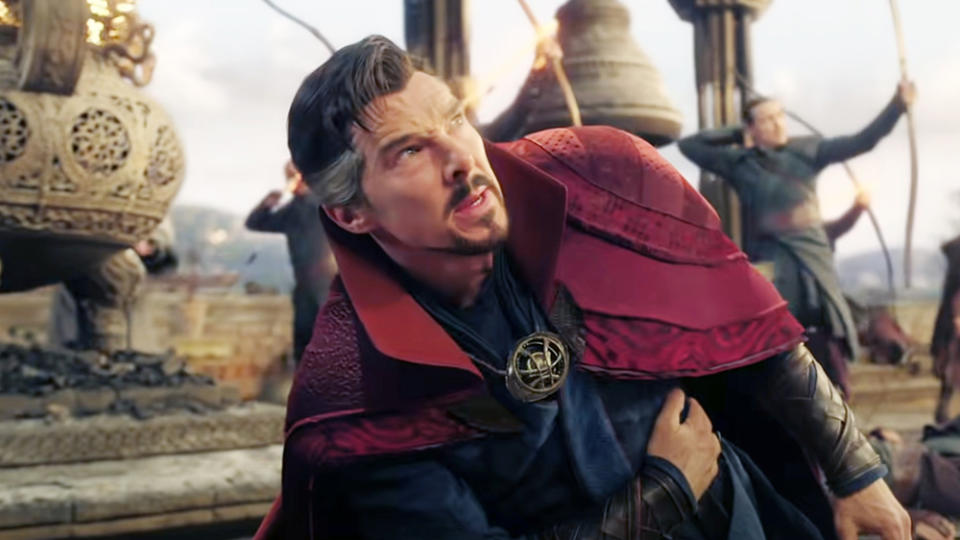Horror-Filled ‘Doctor Strange 2’ Highlights the Genre’s Absence in Oscar Artisan Categories
- Oops!Something went wrong.Please try again later.
- Oops!Something went wrong.Please try again later.
- Oops!Something went wrong.Please try again later.


The horror genre is one of the most undervalued art forms in the space of critical accolades. However, scramble in the superhero factor, like Marvel’s newest entry, “Doctor Strange in the Multiverse of Madness” from Sam Raimi, and you have a product that will indeed generate discussion and divisive reactions.
More from Variety
Box Office: 'Doctor Strange 2' Ignites Internationally With $27 Million
Box Office: 'Doctor Strange 2' Aims for Massive $175 Million-Plus Opening Weekend
To get it out of the away nice and early, the anticipated sequel is not a contender to go into the history books like the two previous superhero features that managed to make the cut, “Black Panther” (2018) and “Joker” (2019). Of the entire MCU canon that began with “Iron Man” (2008), the next chapter in the story of Dr. Stephen Strange sits comfortably in the middle of the pact, arguably outdoing its predecessor. While I thoroughly enjoyed most of its offerings and acknowledge the outing among Marvel’s most ambitious swings, there will be many that will fail to get past.
It seems musicals and horror flicks are the two genres that walk into a consumer market with their backs already against the wall because they come with inherent biases. You often hear from people say “I don’t like scary movies” or “I hate musicals,” and taking them to see a new vision for the genre doesn’t typically create believers out of them. Despite that, the horror medium has been criminally ignored in artisan races. It should be a typical default selection in races, such as makeup and hairstyling and sound. However, time and time again, they are passed over the more awards-friendly, prestige films.
See the updated Oscar predictions: Variety’s Awards Circuit Collective Oscars Predictions
While the Academy can proudly stand by its decision to award films like Jonathan Demme’s classic “The Silence of the Lambs” (1991), one of three films in history to win the “big five” — picture, director, actor (Anthony Hopkins), actress (Jodie Foster) and adapted screenplay (Ted Tally) — very few can receive the momentary consideration for “worthiness” of accolades. Noteworthy, the Academy’s members are not the only ones to blame for this, as critics and journalists often act as gatekeepers to what is or is not an “Oscar-worthy” feature.
Qualifying phrases like “highbrow” or “surprisingly smart” have to be used as a prefix to give cinephiles permission to revere a movie and “consider it” for year-end awards and top 10 lists.
Raimi has been an unrelenting lover of horror while also focusing on embracing new and creative minds, such as producing the live-action short “You’re Dead Hélène” this past awards season. Moreover, we need Raimi to make films to expand the cinematic palettes of Hollywood and cinephiles alike. Six horror movies have been nominated for best picture in 94 years, depending on your classification of the medium — “The Exorcist” (1973), “Jaws” (1975), “The Silence of the Lambs” (1991), “The Sixth Sense” (1999), “Black Swan” (2010) and “Get Out” (2017).
Looking for apt comparisons to the “Doctor Strange” sequel, classics like David Cronenberg’s “The Fly” (1986) come to mind with its gruesome body horror and disturbing imagery. Although that film was a deserved Oscar winner for best makeup, Raimi’s movie relies more on CGI for its scarier junctures and may face a more challenging time getting on the shortlist, depending on how the competition field shakes out.
The definition of what constitutes “horror” has been heavily debated for decades, just like the designations of “sci-fi.” (Would you count “The Shape of Water” in that discussion?) One thing is clear, despite billions upon billions of dollars grossed at the box office, Marvel has mostly found room to be embraced in visual effects categories, which “Multiverse of Madness” is likely to factor into once again, while perhaps making a play for the sound race as well.
The previous Oscar nominations and wins for Marvel Studios have been:
“Iron Man” (2008) – sound editing
“Iron Man 2” (2010) – visual effects
“The Avengers” (2012) – visual effects
“Iron Man 3” (2013) – visual effects
“Captain America: The Winter Soldier” (2014)
“Guardians of the Galaxy” (2014) – makeup and hairstyling and visual effects
“Doctor Strange” (2016) – visual effects
“Guardians of the Galaxy Vol. 2” (2017) – visual effects
“Black Panther” (2018) – best picture, production design (won), costume design (won), sound mixing, sound editing, original score (won) and original song
“Avengers: Infinity War” (2018) – visual effects
“Avengers: Endgame” (2019) – visual effects
“Shang Chi and the Legend of the Ten Rings” (2021) – visual effects
“Spider-Man: No Way Home” (2021) – visual effects (co-production with Sony Pictures)
Where we should be so lucky is if composer (and criminally overdue for an Oscar statuette) Danny Elfman can replicate Ludwig Göransson’s noteworthy achievement on “Black Panther.” Elfman’s work on “Doctor Strange 2” is among his most indelible career outings behind his masterworks such as “Batman” (1989), “Edward Scissorhands” (1990), “The Nightmare Before Christmas” (1993) and “Big Fish” (2003). His aural arrangements, which only heighten the fear and tension of some of the film’s most pivotal and gruesome scenes, are sublime, and the hopes are the music branch don’t suffer from short-term memory loss in the next seven months.

Everett Collection
Benedict Cumberbatch, Elizabeth Olsen, Benedict Wong, Rachel McAdams and MCU newcomer Xochitl Gomez all show up with their A-game, carving out individual moments for themselves that fans will adore. The Saturn Awards should have a field day with the actors.
Read more on TV Awards: Variety’s Awards Circuit Emmys Predictions Hub
The mixture of tones may feel inconsistent to some. Still, screenwriter and Emmy winner Michael Waldron (“Rick and Morty”) strikes a comfortable balance that lays the groundwork for an exciting future for the MCU under the umbrella of a terrifying storytelling narrative. Horror has excelled when mixed with other genres. “Alien” (1979) from Ridley Scott and “Aliens” (1986) from James Cameron brings terror to science fiction, thus allowing the latitude to embrace a new type of Oscar-worthy acting turn from Sigourney Weaver. They both received noms for visual effects, while the sequel walked away with the sound editing statuette and a deserved nod for Weaver in best actress.
Tim Burton’s “Sleepy Hollow” (1999) brings the filmmaker’s signature style to a period piece, unafraid to embrace the lighter moments with funny one-liners from its leading man Johnny Depp. The dark comedy took home the Oscar for production design (then called “art direction”), with two other mentions for cinematography and costumes.
“Doctor Strange in the Multiverse of Madness” will generate passion, probable feelings of disappointment and unfamiliarity, and maybe even a yelp or two during the viewing. In the world of “for your consideration,” every movie should be considered for the Oscars, especially when artisans such as these bring the goods.
The film opens in theaters on May 6.
Best of Variety
Emmy Predictions: Limited Series - We Could Have Six Nominees, if a Handful More Shows Are Submitted
Sign up for Variety’s Newsletter. For the latest news, follow us on Facebook, Twitter, and Instagram.

